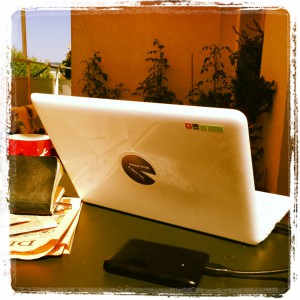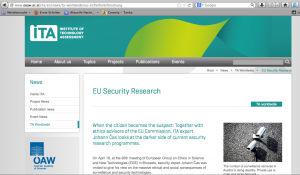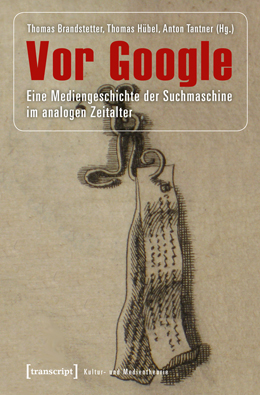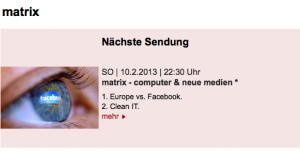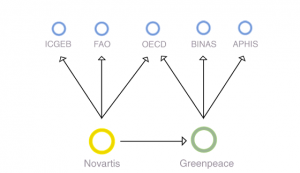 We (Katja Mayer and I) have just finalized our course on digital methods for next summer term. We’ll be teaching at the Department of Social Studies of Science, University of Vienna. The seminar will be part of the master program “Master of Arts – Science. Technology. Society”, but, in principle, everyone can join – if I understood it correctly. I’m not really familiar with the new curriculum yet though.. But I’m sure it will be fun since theoretical inquiry will be mixed with hands-on empirical research – fed by our own research and recent studies from our colleagues.
We (Katja Mayer and I) have just finalized our course on digital methods for next summer term. We’ll be teaching at the Department of Social Studies of Science, University of Vienna. The seminar will be part of the master program “Master of Arts – Science. Technology. Society”, but, in principle, everyone can join – if I understood it correctly. I’m not really familiar with the new curriculum yet though.. But I’m sure it will be fun since theoretical inquiry will be mixed with hands-on empirical research – fed by our own research and recent studies from our colleagues.
© image credit: Digital Methods Initiative (Amsterdam)
Here’s the syllabus. Join us if you like! Or otherwise, follow our seminar blog (which we plan to write if we find the time to do so 😉 )
Digital Methods – How Do We Know?
New information and communication technologies (ICTs) and social media like Google, Facebook and co. crucially change our daily lives. The “computational turn”, however, also affects the social sciences and humanities. Applications and software programs – ranging from simple presentation to complex network visualization tools – increasingly intrude into and shape scientific practices and the ways we conduct, present, and disseminate research. Rooted in the tradition of Science and Technology Studies (STS) this seminar addresses the central question of how digital methods of all kinds influence “how we know”. We will experiment with and critically examine various software tools and visualization techniques to better understand the growing number of digital methods used not only in the natural sciences, but increasingly also in the social sciences and humanities. We will ground these new tools respectively in older research traditions, discuss implications digital methods have in the process of knowledge production, and how to meet new challenges arising in the growing field of “digital social sciences and humanities”.
Drawing on literature from STS and critical new media studies, we aim to discuss the following questions: What are “digital methods” and what kind of knowledge(s) do they create? How do (digital) methods organize our research objects and what realities are enacted by them? How can hyperlink networks and Google analyses be used to analyze controversies like climate change or biofuels? How can social networking services, and Twitter in particular, be used to analyze political discourses and “hacktivist mobilization”? What information hierarchies and biases does commercial software trigger in the research process, and how can we handle this problem? What is “big data” and what are the benefits and dangers of large-scale computational science? And, finally, what are the implications of open access, creative commons, and Wikis in the context of both research and politics?
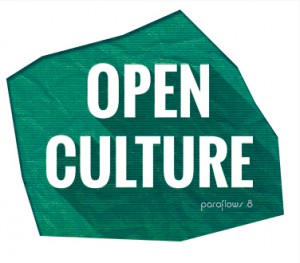 Google, Facebook, Amazon & co. Sie alle haben sich geschickt in Stellung gebracht. Die offene Struktur des Netzes durch geheime Algorithmen, digitale Zäune, und Werbenetzwerke beschnitten und dem Konsum ausgeliefert. Sie sind zentrale Knoten in einem dezentralen Netzwerk. Mächtige Player in einem per se machtfreien Raum. Doch ihre Macht ist nur geliehene Macht. Sie ist Produkt unserer Vernetzung. Unserer Gier nach Aufmerksamkeit, Zuspruch, Klicks und Likes. Ihre Macht ist ein Netzwerkeffekt, wie ich vor dem Hintergrund der Akteurs-Netzwerk Theorie diskutieren möchte. Doch was passiert wenn wir uns ausloggen aus dem System? Ausklinken aus dem mächtigen Netzwerk?
Google, Facebook, Amazon & co. Sie alle haben sich geschickt in Stellung gebracht. Die offene Struktur des Netzes durch geheime Algorithmen, digitale Zäune, und Werbenetzwerke beschnitten und dem Konsum ausgeliefert. Sie sind zentrale Knoten in einem dezentralen Netzwerk. Mächtige Player in einem per se machtfreien Raum. Doch ihre Macht ist nur geliehene Macht. Sie ist Produkt unserer Vernetzung. Unserer Gier nach Aufmerksamkeit, Zuspruch, Klicks und Likes. Ihre Macht ist ein Netzwerkeffekt, wie ich vor dem Hintergrund der Akteurs-Netzwerk Theorie diskutieren möchte. Doch was passiert wenn wir uns ausloggen aus dem System? Ausklinken aus dem mächtigen Netzwerk?
